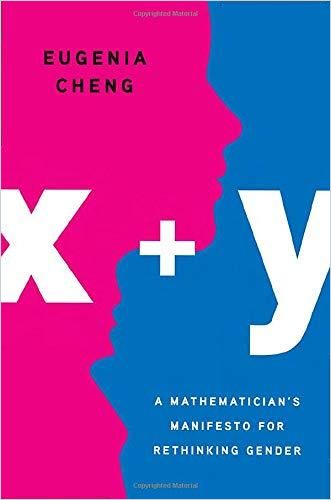Dr. Eugenia Cheng applies mathematics, logic and common sense to transcend gender stereotypes.

Individual Actions
An honorary visiting fellow at City University in London, Eugenia Cheng is also a scientist in residence at the School of the Art Institute of Chicago. Teaching for years in the male-dominated mathematics arena revealed deep inequities to Cheng, setting her on a new career path to prove the fallacy of academia’s bias against women in math and science. Cheng combines elegant mathematical formulas, original thinking and piercing insights to illustrate why transcending gender stereotypes creates a more equitable, productive, cooperative society.
The New York Times Book Review said that Cheng’s “tone is clear, clever and friendly…she is rigorous and insightful…a lucid and nimble expositor.” The New York Times reviewer who wrote about Cheng’s book How to Bake π wrote, “Dr. Cheng…has a knack for brushing aside conventions and edicts, like so many pie crumbs from a cutting board.”
Patterns
Cheng observed people impeding themselves “interpersonally, structurally” and “systematically” through their attitudes about gender. She suggests that math theories can provide new perspectives, reframing ideas about gender equality and feminism. She asserts that math proves that averages do not apply to individual people.
With some people’s definition of feminism being highly restrictive and some other people’s encompassing almost everything, it is a divisive concept even before it has even really gotten past the definitions.Eugenia Cheng
She explains that people use patterns to construct large ideas from smaller ones. This means forgetting certain details in search of a deep similarity and a new concept. Cheng offers, as an example, that some women don’t speak up in meetings or ask questions in class. This identifies a pattern. Observers then can test and research the theory of this pattern to examine the underlying “whys.”
Cheng is adamant that people should relate to each other through individual actions, rather than referring to limiting biological descriptions such as male or female, Black or white. She believes gender should never keep people from realizing their dreams. Male and female traits, she maintains, should never be a zero-sum, win-or-lose game.
Differences
Cheng notes that psychology lacks one clear path for discerning whether observed behavioral and problem-solving differences are learned or innate. She reminds readers that standard tests cannot reliably measure true math ability, and she recommends just acknowledging that men and women differ in their approaches to work, political issues, science and math. Cheng wants women who feel limited by their environment to dream up different worlds with new dimensions.
Society needs a new gender-free vocabulary, Cheng argues, to address character traits. She celebrates as women develop new language to challenge and change the balance of power and to motivate others to achieve their personal goals.
Ingressive and Congressive
The word “ingressive,” Cheng explains, means emphasizing the self over society; “congressive” emphasizes cooperation and interconnectedness. These terms form the crux of her position that people must separate issues of discrimination and prejudice from these character traits. People can be ingressive or congressive in a variety of situations and, Cheng notes, both patterns are learned behaviors.
Cheng first taught at traditional ingressive universities with predominantly male student populations. Later she joined the faculty at the School of the Art Institute of Chicago, where she could reach pupils through congressive means. As a teacher, Cheng recounts rewarding congressive behavior such as collaboration and open-mindedness, and discouraging ingressive postures such as bullying and criticism.
Education could be seen as the root of all these ingressive problems, but as always, it’s a cycle: Education is ingressive because society is ingressive, and society is ingressive because we are all educated to be ingressive.Eugenia Cheng
Cheng calls on society and its institutions to celebrate collaborative, foundational work, along with the contributions of individuals and team leaders. She abhors that scientific and academic breakthroughs are competitive. Posting articles online to solicit feedback, Cheng makes clear, is congressive, while keeping an important breakthrough under wraps is ingressive. Cheng urges influential people, especially teachers and parents, to show the next generations how to be less ingressive. She urges you to promote congressiveness in organizations, universities and companies, and to extend it further to change entire societal processes.
Passionate Logic
If you are engaged in gender equality or seek new language paradigms to express equity issues, Cheng’s articulate, logical and passionate arguments will inspire you. If you resent feminism, oppose language changes or regard office sexism as a non-issue, you may find the most lucid arguments you’ve encountered in Cheng’s powerful rationalism. She may not change your heart or mind, but she provides a sound explanation of the oppression and effects of sexist language and behavior in society and the workplace.
We can encourage congressive behavior in the people around us and practice neutralizing ingressive energy wherever we encounter it. Eugenia Cheng
While Cheng’s rigorous math and, at times, opaque equations may leave laypeople behind, her work seems to be a perfect text for high school students seeking clarity around these issues, for college students seeking to broaden their understanding and for adults puzzled by a new world of non-binary pronouns and identities.
Eugenia Cheng’s other books include The Art of Logic in an Illogical World; Beyond Infinity; and How to Bake π.







